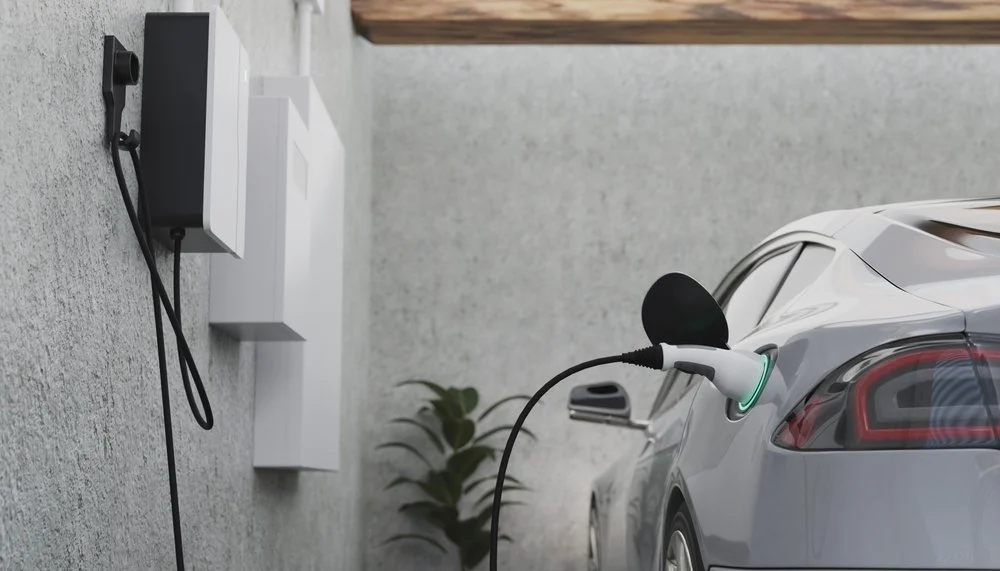What is a Granny Charger? Complete Guide to Emergency EV Charging
Source: Shutterstock
If you're new to the world of electric vehicles, you've probably encountered the curious term "granny charger" and wondered what it means. This seemingly odd name actually refers to one of the most basic but important pieces of equipment that comes with most electric cars - the emergency charging cable that can plug into any standard household socket.
Understanding granny chargers is essential for anyone considering an electric car through a company scheme or exploring EV ownership. While they serve an important purpose as backup charging solutions, granny chargers have significant limitations that make them unsuitable for regular use.
What Exactly is a Granny Charger?
A granny charger, also known as a "granny cable" or "emergency charging cable," is a portable charging lead that connects your electric vehicle to a standard UK domestic 3-pin socket. The colloquial name comes from the idea that you might use this type of charger when visiting elderly relatives who don't have dedicated EV charging infrastructure installed.
These cables feature a standard UK household plug on one end and an EV connector on the other - typically either a Type 1 or Type 2 socket depending on your vehicle. The cable includes built-in safety features and charging control electronics housed in a control box along the cable's length.
Unlike the sleek, permanently installed home EV chargers that most electric car owners prefer, granny chargers are purely functional devices designed for occasional emergency use rather than daily charging routines.
How Do Granny Chargers Work?
Granny chargers operate by converting the standard AC electricity from your domestic socket into a form suitable for your electric vehicle's battery. They typically deliver power at a rate of 2.3kW, which translates to roughly 8-10 miles of range added per hour of charging.
The charging process is straightforward: plug the domestic end into any standard UK socket, connect the EV end to your vehicle's charging port, and the car will begin charging automatically. The built-in control box manages the power flow and includes safety features to prevent overheating or electrical faults.
However, this simplicity comes with significant limitations. Unlike smart home chargers that can be programmed to charge during off-peak hours when electricity is cheaper, granny chargers operate at whatever rate your household supply provides, with no ability to optimise costs or charging schedules.
Do Electric Cars Come with Granny Chargers?
Most new electric vehicles include a granny charger as standard equipment, particularly those available through electric car salary sacrifice schemes. Tesla vehicles, for instance, always come with their proprietary granny charging cable, while other manufacturers typically include a universal Type 2 variant.
However, if you're considering a used electric vehicle, it's important to check whether the granny charger is included, as previous owners sometimes remove or misplace these cables. When exploring used EV options, always verify that all charging equipment is present.
For those accessing electric vehicles through workplace benefits, most company electric car schemes ensure that all standard equipment, including emergency charging cables, is included with the vehicle.
The Benefits of Granny Chargers
Despite their limitations, granny chargers offer several important advantages that make them valuable emergency tools for electric vehicle owners.
Universal Compatibility
The primary benefit of granny chargers is their universal compatibility with standard electrical infrastructure. Whether you're visiting friends, staying in accommodation without dedicated EV charging, or facing an unexpected situation where your usual charging options aren't available, any standard UK socket can become a charging point.
This flexibility proves particularly valuable for those living in areas where public charging infrastructure remains limited, or for drivers who frequently travel to locations without dedicated EV charging facilities.
Portability and Convenience
Granny chargers are compact and lightweight, making them easy to store in your vehicle's boot alongside other emergency equipment. This portability ensures you're never completely stranded without charging options, providing peace of mind for longer journeys or unexpected circumstances.
Unlike fixed home charging installations that require professional setup and permanent mounting, granny chargers can be used anywhere there's electrical supply, making them invaluable backup solutions.
Cost-Effective Emergency Solution
Since most electric vehicles include granny chargers as standard equipment, there's no additional cost for this emergency charging capability. This makes them an economical safety net compared to relying solely on potentially expensive public rapid charging networks during emergencies.
The Significant Limitations of Granny Charging
While granny chargers serve important emergency functions, they come with substantial limitations that make them unsuitable for regular use, particularly for drivers who want to maximise the benefits of electric vehicle ownership.
Extremely Slow Charging Speeds
The most significant drawback of granny charging is the painfully slow charging rate. At just 2.3kW, a granny charger delivers power at roughly one-third the rate of a basic 7kW home charger. For a typical electric vehicle with a 60kWh battery, a complete charge using a granny charger could take over 24 hours.
This slow charging speed makes granny chargers impractical for daily use, especially for drivers with longer commutes or those who use their vehicles frequently. In contrast, a proper home EV charger can fully charge the same battery in 8-10 hours overnight.
No Smart Charging Features
Modern home EV chargers offer sophisticated smart features that can significantly reduce electricity costs and improve the charging experience. These include scheduling charging during off-peak hours, integration with special EV electricity tariffs, and remote monitoring capabilities.
Granny chargers lack all these advanced features, operating as simple "dumb" chargers that draw power at standard rates whenever they're plugged in. This limitation means missing out on potential savings of hundreds of pounds annually through optimised charging schedules.
Safety Concerns with Extended Use
While granny chargers include basic safety features, they're not designed for the sustained, regular use that characterises normal EV ownership. Extended use can place additional stress on domestic electrical circuits, particularly in older properties where wiring may not be optimised for continuous high-power loads.
Professional EV charging installations include dedicated circuits, appropriate safety equipment, and load balancing features that make them far safer for regular use than repeatedly drawing high currents through standard domestic sockets.
Impact on Household Electrical Systems
Regular granny charging can affect your home's electrical capacity, particularly if you're running other high-power appliances simultaneously. This can lead to circuit overloads, blown fuses, or in extreme cases, electrical fires in properties with inadequate wiring.
Dedicated home chargers are installed by qualified electricians who ensure your property's electrical system can safely handle the additional load, making them a much more reliable long-term solution.
Why Home Charging is Essential for EV Owners
For anyone seriously considering electric vehicle ownership, particularly through salary sacrifice schemes that make EVs more affordable, investing in proper home charging infrastructure is essential.
Speed and Efficiency
A 7kW home charger provides three times the charging speed of a granny charger, meaning you can wake up each morning with a fully charged vehicle after overnight charging. This transforms the EV ownership experience from one of careful range management to simple overnight routine.
Cost Savings Through Smart Charging
Home EV chargers can be programmed to operate during off-peak hours when electricity is significantly cheaper. Combined with special EV tariffs, this can reduce charging costs by 60-70% compared to peak-rate charging, potentially saving £600-£1,000 annually for average drivers.
Safety and Reliability
Professional charging installations include appropriate safety equipment, dedicated circuits, and weatherproofing that make them far more reliable than emergency charging solutions. This reliability is particularly important for drivers who depend on their vehicles for daily commuting.
Integration with Renewable Energy
Modern home chargers can integrate with solar panel installations, allowing EV owners to charge their vehicles using renewable energy generated at home. This capability is impossible with basic granny chargers.
Making EV Ownership Affordable
For many drivers, the cost of electric vehicles and associated infrastructure can seem daunting. However, electric car salary sacrifice schemes make both vehicles and charging infrastructure significantly more affordable.
Through salary sacrifice, drivers can save 20-50% on electric vehicle costs compared to traditional leasing or purchasing. With the current 3% Benefit-in-Kind rate for electric vehicles, the tax advantages are substantial. Many salary sacrifice providers, including The Electric Car Scheme, can include home charger installation as part of the package, further reducing costs.
The Future of EV Charging
As the UK's electric vehicle infrastructure continues expanding rapidly, granny chargers will likely become even more of a backup solution rather than a primary charging method. The government's target of 300,000 public charging points by 2030, combined with improving home charging solutions, means future EV owners will have increasingly convenient charging options.
For current and prospective electric vehicle owners, understanding granny chargers' role as emergency equipment rather than daily charging solutions is crucial for making informed decisions about EV adoption and infrastructure needs.
The Bottom Line - Use a Dedicated Charger
Granny chargers serve an important function as emergency backup charging solutions for electric vehicles, providing universal compatibility and peace of mind for drivers facing unexpected charging challenges. However, their slow charging speeds, lack of smart features, and safety limitations make them unsuitable for regular use.
For anyone considering electric vehicle ownership, particularly through cost-effective salary sacrifice schemes, investing in proper home charging infrastructure is essential for maximising the benefits of electric motoring. While granny chargers provide valuable emergency capability, the convenience, speed, and cost savings of dedicated home charging make it an indispensable part of the modern EV ownership experience.
Understanding these distinctions helps drivers make informed decisions about their charging needs and ensures they can fully enjoy the environmental and financial benefits that make electric vehicles an increasingly attractive choice for UK motorists.
Are you an employer?
BOOK A DEMOAre you an employee?
SEE AVAILABLE CARSYou might also like…
Last updated: 26/08/2025
Our pricing is based on data collected from The Electric Car Scheme quote tool. All final pricing is inclusive of VAT. All prices above are based on the following lease terms; 10,000 miles pa, 36 months, and are inclusive of Maintenance and Breakdown Cover. The Electric Car Scheme’s terms and conditions apply. All deals are subject to credit approval and availability. All deals are subject to excess mileage and damage charges. Prices are calculated based on the following tax saving assumptions; England & Wales, 40% tax rate. The above prices were calculated using a flat payment profile. The Electric Car Scheme Limited provides services for the administration of your salary sacrifice employee benefits. The Electric Car Scheme Holdings Limited is a member of the BVRLA (10608), is authorised and regulated by the FCA under FRN 968270, is an Appointed Representative of Marshall Management Services Ltd under FRN 667174, and is a credit broker and not a lender or insurance provider.
Copyright and Image Usage: All images used on this website are either licensed for commercial use or used with express permission from the copyright holders, in compliance with UK and EU copyright law. We are committed to respecting intellectual property rights and maintaining full compliance with applicable regulations. If you have any questions or concerns regarding image usage or copyright matters, please contact us at marketing@electriccarscheme.com and we will address them promptly.




